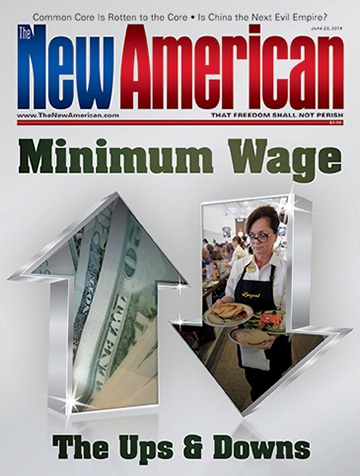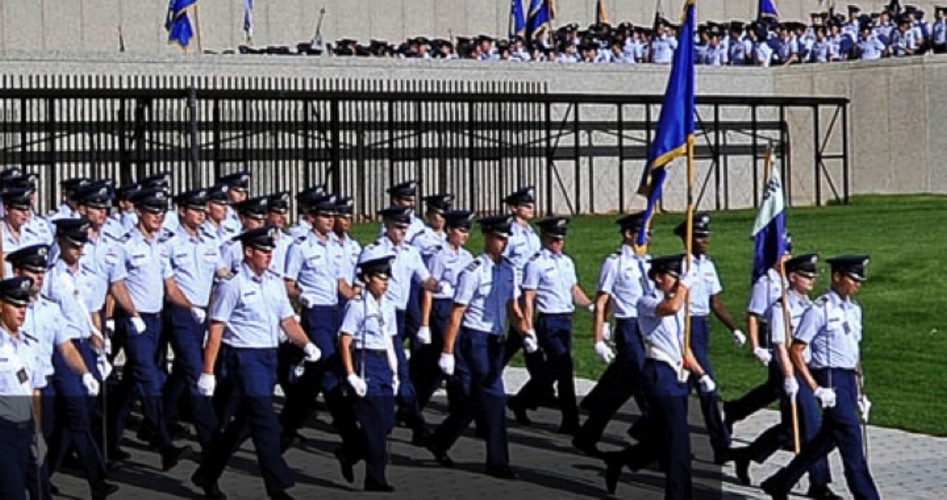Inside Track
Biden Challenges Air Force Academy Grads to Shape a “New World Order”
Vice President Joe Biden, addressing the Air Force Academy’s graduating class on May 28 in Colorado Springs, said he believes that the class “has an incredible window of opportunity to lead in shaping a new world order for the 21st century.”
It was the second time in a little over a year that Biden has used the term “new world order” to describe his vision for America’s role in the world, the earlier one being his April 5, 2013, address to the 38th Annual Conference of the Export-Import Bank of the United States in Washington, D.C. In that speech, Biden maintained that “the affirmative task we have now is to actually create a new world order.”
Even earlier, the phrase was used by President George H.W. Bush in his televised speech on the Iraq situation before a joint session of Congress on September 11, 1990, where he said: “Out of these troubled times, our fifth objective — a new world order — can emerge.”
Bush delivered an encore of his New World Order mantra on January 16, 1991, in his address to the nation announcing allied military action in the Persian Gulf, when he declared: “We have before us the opportunity to forge for ourselves and for future generations a new world order — a world where the rule of law, not the law of the jungle, governs the conduct of nations.”
The phrase was highly esoteric when first used by Bush, but was already quite familiar to those who had studied the history of internationalism — the longstanding movement to erase national borders and to transfer power from sovereign nations to supranational institutions. Each reference to a “new world order” by public figures such as Bush and Biden has garnered much media attention and furnished opportunities to discuss what is meant by the term and how the objectives of those advocating it will be implemented. International organizations such as the World Court, the old League of Nations, and the United Nations have long been regarded by internationalism’s proponents and opponents alike as essential foundations on which the New World Order will be built.
During his speech at the Air Force Academy, Biden asserted that the graduates’ role in shaping a new world order for the 21st century could be done “in a way consistent with American interests and common interests.” Moving on to specifics, he said, “First and foremost our work begins by rebuilding America’s foundations, our economic foundations, our moral and strategic foundations.”
Few would disagree up to that point, but Biden then promoted the internationalist viewpoint that the United States must continue to be engaged with a physical presence around the world, citing the many areas and reasons America should intervene, “including violent extremism that is becoming more diffuse, countries emerging from chaos in the midst of war,” and more. He stated:
The president and I believe that all these challenges require the United States to stay engaged in the world, to lead and to be a force for positive change, because one thing we know for certain: If America is not on the field, the vacuum will be filled.
Harkening back to the post-World War II period, the vice president asserted that the United States made the right choice by continuing its overseas presence, instead of bringing all our troops home once victory had been secured:
There was an overwhelming desire in your grandparents’ and my parents’ generation to bring home every single one of the 12 million forces that remained stationed in Europe and Asia. But the leaders of that day, they knew, that generation knew that America had to stay engaged. They knew that they had to lay the foundation for a new world order, a world order that brought the longest period of sustained peace in Europe and Asia and generated the most significant economic growth in the history of mankind.
Biden’s next statement was especially significant:
[Americans] helped write the constitutions of Germany and Japan that led to democratic governments and guaranteed that neither nation would ever possess a nuclear weapon. They formed the most significant military alliance in the history of the world — NATO — out of the ashes of war.
Keeping both former enemies at a military disadvantage helped fuel the argument that a U.S. presence was necessary to defend these new allies. As of 2013, there were still approximately 50,000 U.S. military personnel stationed in Japan, whose post-war, U.S.-influenced constitution keeps it rather weak, militarily, for a major industrial power. Another 40,000 are stationed in Germany, a result of the establishment of NATO, which — in and of itself — is problematic for all Americans who value their sovereignty.
Few Americans are aware that NATO is actually a subsidiary of the United Nations, as John F. McManus, president of The John Birch Society, wrote in an article to that effect. He noted:
NATO was sold to the American people and the U.S. Congress in 1949 as an alliance needed to prevent the Soviet Union from gobbling up more nations to its West….
Opponents of entangling the U.S. in additional international pacts claimed correctly that membership in NATO would require U.S. involvement in disputes all over the world. Only a few knew that NATO was created as a “Regional Arrangement” authorized by Articles 51-54 of the United Nations Charter.
Of course, in the wake of the carnage of World War II (and the use of the atomic bomb against Japan), the UN was regarded by most Americans as “the last hope for peace.” Those who warned that the UN was part of the internationalists' plan to create a “New World Order” were often ridiculed as “conspiracy theorists.” But, instead of helping prevent wars, U.S. membership in the UN and NATO has been instrumental in drawing America into war after war.
McManus continued in his article:
The [NATO] treaty's Article 5 pledges all signers to consider an attack on any member nation as an attack on all that must be met by all with a military response.
In 1950, membership in NATO was cited by President Truman as his authority to send American forces into Korea to counter North Korea’s invasion of its southern neighbor.
Later, the precedents established by NATO led to creation of a virtually identical treaty known as the Southeast Asia Treaty Organization (SEATO). President Lyndon Johnson pointed to it for authority to commit hundreds of thousands of U.S. forces to Vietnam.
The trend has continued. McManus noted in another article that “U.S. forces that have been in Afghanistan for almost 10 years were originally sent under authorization supplied by the UN’s NATO stepchild. Their continued participation in this dragged-out venture has always been a NATO/UN operation.”
The U.S. presence in Afghanistan has now been maintained for almost 13 years. NATO defender Biden stated in his speech that “by the beginning of next year, we’ll have fewer than 10,000 U.S. service members in Afghanistan. They will be focused on two explicit missions: training Afghan forces and operations against the remnants of al-Qaeda.”
But, lest the Air Force graduates or anyone else think that that is the end of U.S. interventionism around the world, or that the hard lessons learned in Korea, Vietnam, Iraq, or Afghanistan had finally sunk in, Biden said:
But the end of these two wars affords us an opportunity. It allows us to refocus our intelligence and military assets and resources italics to other parts of the world where they are needed, where we face new challenges. [Emphasis added.]
It was at that point that Biden assured the graduates that, while they may have missed out on the wars in Iraq and Afghanistan, “your class has an incredible window of opportunity to lead in shaping a new world order for the 21st century.”
While a thorough understanding of exactly what the New World Order entails requires searching far back into the world’s history (some say as far back as the French Revolution), George Orwell, in his too-realistic-for-comfort novel 1984, described it as well as anyone: “The three major powers were not fighting this perpetual war for victory, they were fighting to keep a state of emergency always present as the surest guarantee of authoritarianism.”


